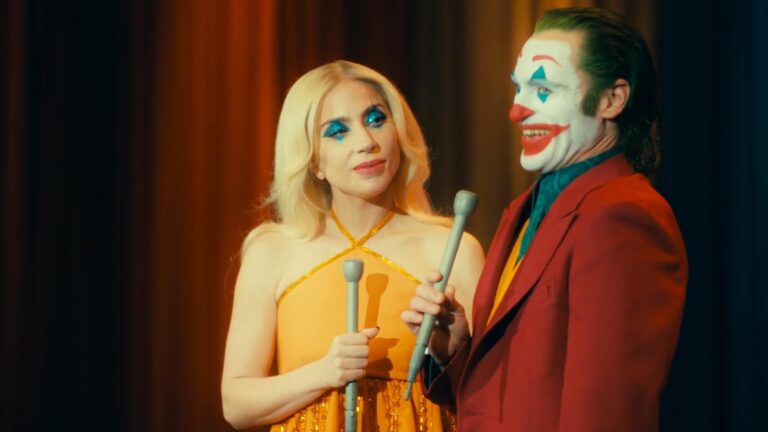For all intents and purposes, “Joker: Folie à Deux” soars when it goes full-on musical, and bores with its thin story when it doesn’t.
Folie à Deux, aka Madness of Two
The film establishes early on that, following the events of the first “Joker” film, Arthur Fleck (Joaquin Phoenix) has been committed to Arkham State Hospital for his crimes, with his case awaiting what the media touts as the “trial of the century.” Representing Arthur, lawyer Maryanne Stewart (Catherine Keener) aims for the insanity defense, briefing Arthur that it was the Joker, not he, who committed the crimes. On the other hand, assistant district attorney Harvey Dent (Harry Lawtey) represents the city of Gotham and pushes for the death penalty.
A few days before Arthur stands trial, guard Jackie Sullivan (a menacing Brendan Gleeson) decides to transfer Arthur to B Ward, where nonviolent patients use music and song as part of their therapy. There, Arthur locks eyes with a woman named Lee Quinzel (an underused Lady Gaga), a mysterious fan who professes her admiration for him and his crimes.
This seemingly fortuitous encounter compels Arthur to feel that someone finally “gets” him, which threatens to undo the efforts Maryanne has exerted so far to help him avoid capital punishment and instead get the mental help he needs.
As both Arthur and Lee embark on a toxic and deadly romance punctuated by musical numbers, ‘Folie à Deux’—which refers to the delusion or mental illness shared by two people in close association—becomes a musical film that examines the damaged psyches of its two main characters.
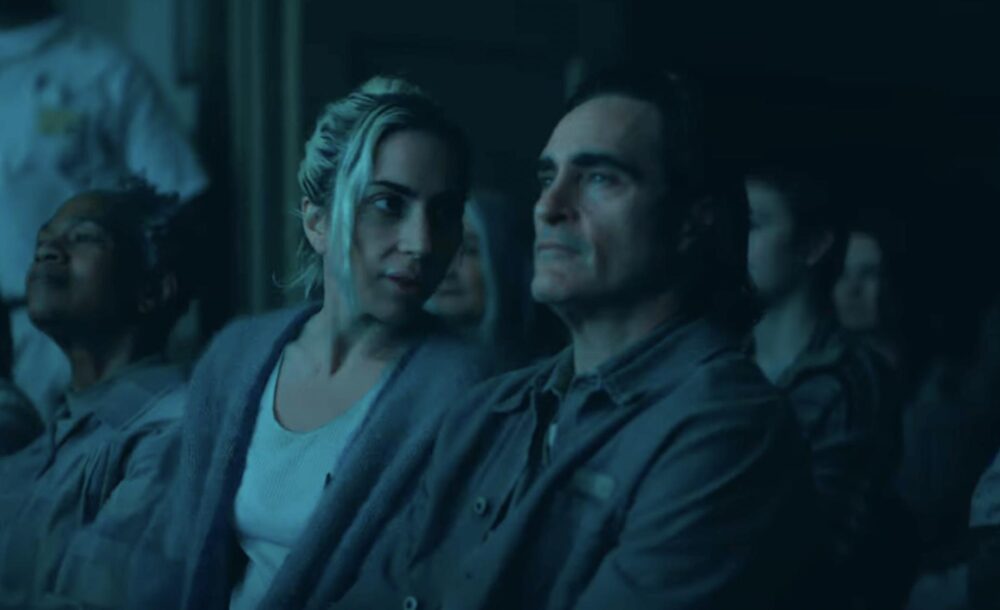
Musical Madness: When the Film Soars
Does it succeed? That depends on where you draw the line. But here’s the thing: ‘Folie à Deux’ soars when Phillips zeroes in on the musical sequences. In fact, the five-minute opening animated sequence titled “Me and My Shadow” pays homage to the magic of music in film. In the animated sketch, the Joker fights his own shadow for stealing his thunder. The tussle begins when the shadow assumes the Joker persona, locking the corporeal entity in a cabinet; and ends with the police taking over amidst the chaos caused by both characters.
As the sequence fades to give way to live action, we hear the song “Get Happy” whistled and hummed throughout both sequences. If there’s one thing Phillips utilizes to the hilt in the film, it’s the use of songs from classic musicals as either expository plot points or foreshadowing. Here, several people whistle and sing “Get Happy,” including Jackie, who asks a morose Arthur,
“You got a joke for me today?”
With “Folie à Deux,” director Phillips and co-scriptwriter Scott Silver take the audacious step of blending dark psychological drama with musical theater—an unconventional leap for a franchise born out of gritty realism and nihilism.
While its moments of musical splendor and its continued exploration of Arthur’s fractured psyche bring something fresh to the table, one can’t help but feel that this movie is bogged down by an uneven narrative and a frustrating lack of character depth, especially when it strays from its boldest impulses.
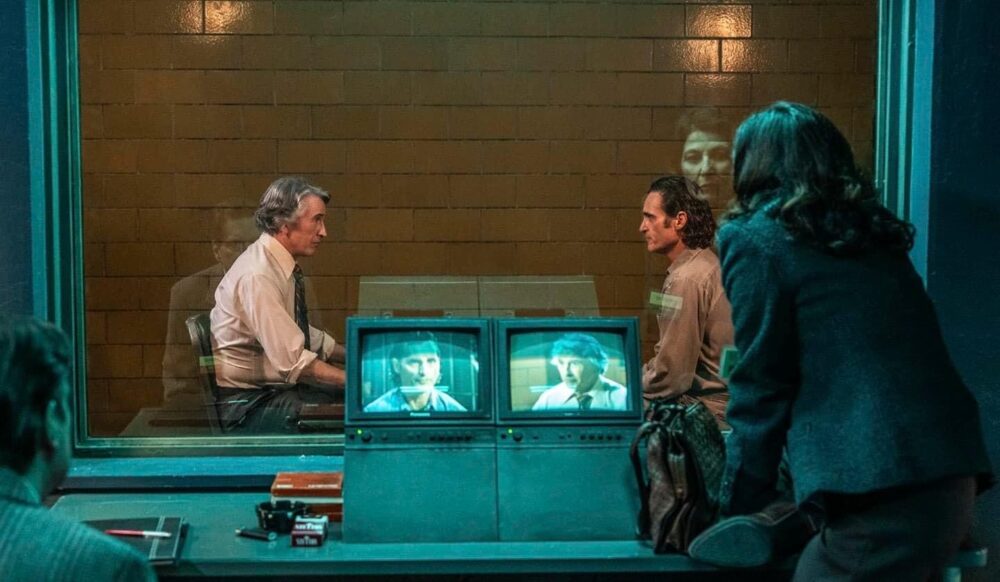
Music as Escape into Fantasy
Of course, the decision to turn this film into a semi-musical should raise eyebrows. That said, it’s actually in these sequences that the film truly shines. The soundtrack, complemented by Hildur Guðnadóttir’s haunting score, plays a significant role in Arthur and Lee’s escape into their shared fantasies. In those scenes, the screen bursts to life in a way that makes the rest of the film’s gloomy and oppressive setting pale in comparison.
These moments—whether they involve serenading each other in a surreal rooftop dance against a giant moon or launching into a sociopathic version of a variety talk show—are brilliantly executed. More importantly, they provide rare emotional insight into the characters. Phoenix’s Arthur, still struggling to reconcile his mental instability with his notorious Joker persona, feels momentarily freed in these sequences, allowing the audience a glimpse of the fractured man who dances along the edge of fantasy and delusion.
Conversely, Gaga’s portrayal of Lee, while more subdued than expected, finds its most compelling moments during these musical flights. Her performance of “Close to You” as a raw, scratchy, almost obsessive love anthem during a prison visit is chillingly effective. There’s something with the way she sings that feels more natural. (Think of it as the antithesis to her performance in “A Star is Born.”)
These interludes are vital to the film’s success, as they allow Arthur and Lee to express emotions that they can’t articulate through traditional dialogue. For brief moments, the film touches on the dynamic quality of musicals, where the characters lay bare their innermost thoughts and desires through song. If the film had more confidently embraced this madness, it could have been something truly revolutionary.
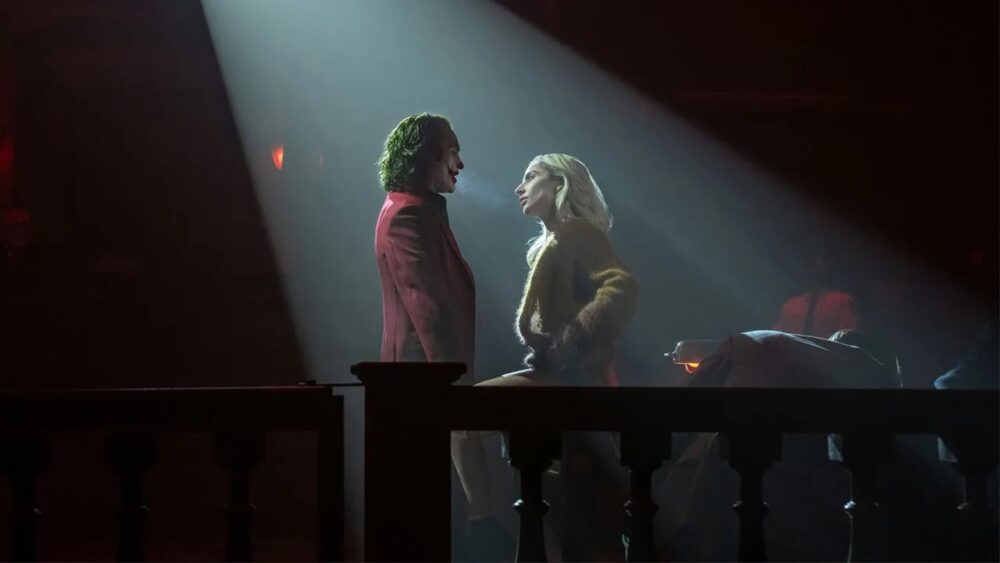
A Thinly Written Screenplay Does This Film In
Unfortunately, “Joker: Folie à Deux” has to stop the music and focus on the story. And here’s where I have problems with the film: when you think about it, “Folie à Deux” packs a pretty basic narrative. For all its exploration of what escapist fantasies might look like for its principal characters, the movie doesn’t really delve into Arthur’s mental health. Even more, the filmmakers could have viewed this as a chance to properly examine mental health, something they borderline romanticized through violence the last time out.
Instead, it keys in on Arthur’s trial for the murders he committed in the first film, where the question of whether he is legally insane dominates the dialogue. This feels like poor writing, as it doesn’t build to the kind of crescendo that the Joker mythos deserves. Were the filmmakers really interested in expanding on this world-building by exploring how the Joker’s influence spread among his rabid supporters? Or were they simply content to recall supporting characters from the first film to take the stand as key witnesses against Arthur?
Also, by keeping Arthur locked up in Arkham for most of the film, Phillips prevents the character from fully spreading his chaotic wings. In the first Joker, Arthur’s transformation into the Joker was terrifying and exhilarating. Here, he feels shackled—more pitiful than dangerous. While Phoenix continues to deliver a gripping performance, the script doesn’t give him the same room to explore the anarchic potential of his character. We see flashes of it, but those moments are too fleeting to recapture the anarchic brilliance of his earlier descent. And with how Phillips chose to end the film, the subpar screenplay stands out like a sore thumb.
A Technical and Musical Marvel—and Nothing More
From a technical standpoint, ‘Folie à Deux’ is often a visual treat. It helps that Lawrence Sher’s cinematography captures the contrasting worlds of Arthur’s grim reality and his vibrant fantasies through the musical sequences.
But even these technical achievements can’t save the film from its lack of narrative depth. For all its visual flair, the film is too often bogged down by its thin plot and its refusal to let Arthur fully embrace his Joker persona. Instead, Todd Phillips’ “Joker: Folie à Deux” settles for a melancholic meditation on trauma and identity, one that feels like a step backward rather than a further evolution of the character.
To which I say: what a wasted opportunity.
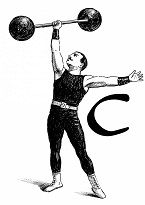
Todd Phillips’ “Joker: Folie à Deux” premiered at the 81st Venice International Film Festival last September 4, 2024. It will have its wide release in the United States on October 4, 2024. Follow us for more coverage.

